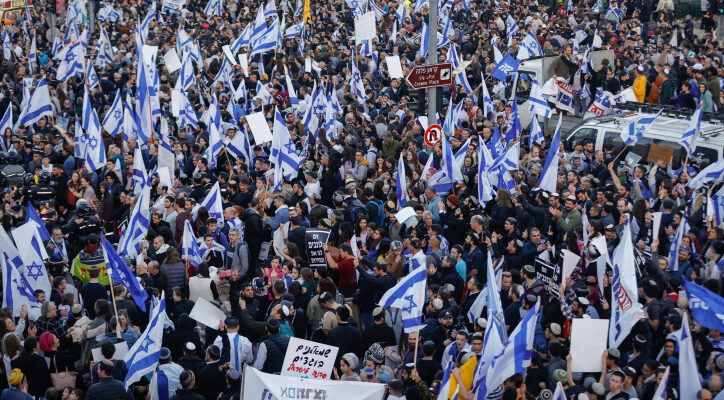The official route ends at the Western Wall Plaza and marchers will not be allowed to ascend on the Temple Mount, the police emphasized.
By JNS
Some 200 Jewish activists are expected to join a contentious Hanukkah march in Jerusalem’s Old City on Thursday evening, the first night of the festival of lights, to protest against Jordan’s control over Judaism’s holiest site, according to organizers and the Israel Police.
In an invite shared to social media, Beyadenu—Returning to the Temple Mount, one of the nine organizations behind the event, said, “This is not just another march, not just another protest! Kick out the [Jordanian Islamic] Waqf and restore full Jewish control over the Temple Mount!”
“We won’t win this war only in Gaza,” Beyadenu wrote in the invite, calling on the Israeli government to expel “the Nazis and their friends in the Waqf” from the Mount.
Dubbed the “Maccabee March” after the Jewish heroes who led the revolt against the Hellenistic Seleucid Empire that culminated in a military victory and the rededication of the Temple almost 2,200 years ago, Thursday’s procession is scheduled to depart at 7.30 p.m. from Tzahal Square in downtown Jerusalem.
A police spokesperson told JNS that participants will pass through the Damascus Gate into the Muslim Quarter of the Old City. The official route ends at the Western Wall Plaza and marchers will not be allowed to ascend to the flashpoint Temple Mount, the police emphasized.
Muslim prayers will continue to be held as usual during all eight days of Hanukkah, and “any attempt to violate public order … will be dealt with decisively,” the spokesperson added.
Ahead of the march, Gaza’s ruling Hamas terror group issued a statement calling on “the Arab and Islamic nations and the brothers in the Kingdom of Jordan” to take action against what it described as an “attempt to impose Zionist control over the blessed Al-Aqsa Mosque.”
“Our people will not allow it—no matter the cost,” Hamas threatened on Wednesday. “We call on our Palestinian people in the West Bank, Jerusalem, and the occupied interior [Israel] to mobilize.”
Meanwhile, the Palestinian Authority called for an “urgent international and American intervention to stop the extreme right-wing march” and falsely claimed that “extremist settlers” were planning to enter the mosque on Thursday.
A spokesperson for the Jordanian Foreign Ministry said Jerusalem’s decision to allow the march to go ahead was an “unacceptable and provocative step worthy of condemnation.”
Amman holds “the Israeli occupation fully responsible for the consequences of this dangerous escalation that coincides with the Israeli aggression against the Gaza Strip,” spokesman Sufian al-Qudah stated on Wednesday.
Alleged threats to the Al-Aqsa mosque, Islam’s third-holiest and built on the site of the ancient Jewish Temples, have long been a rallying cry for terrorism. The 1929 Hebron massacre, in which Arabs murdered 67 of their Jewish neighbors, was sparked by false rumors that Jews were planning to take control of the mosque.
According to the so-called status quo on the Temple Mount, formulated by Israeli Defense Minister Moshe Dayan in 1967, Jews may visit but not pray at the site, which is administered by the Waqf, a branch of Jordan’s Ministry of Awqaf Islamic Affairs and Holy Places.
The P.A. and Hamas have turned the Temple Mount issue and the “Al-Aqsa is in danger” slogan into a major engine for inciting Muslims against the Jewish state. The incitement is conducted in the Palestinian education system, mosques, official media, and social media.
Hamas named its Oct. 7 massacre of more than 1,200 people in southwestern Israel “Operation Al-Aqsa Flood” and claimed that its actions were a response to supposed “Israeli violations in the courtyards of the blessed Al-Aqsa Mosque.”
Moreover, a recent survey of Palestinians in Gaza, Judea, and Samaria carried out by the Arab World for Research and Development research firm concluded that 75 percent of respondents supported the Oct. 7 slaughter of Israeli Jews, with 35% indicating that the main reason for the attack was to “stop violations of Al-Aqsa.”




